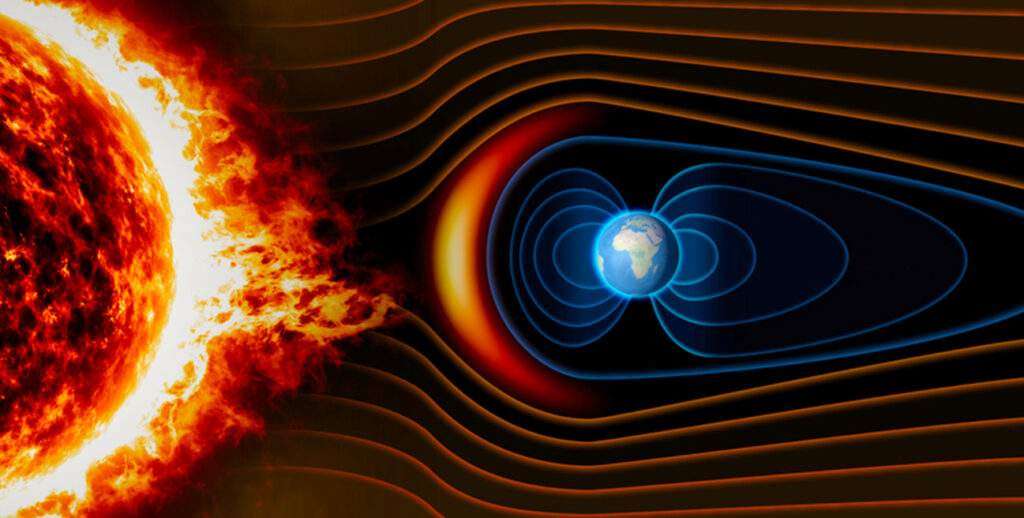
Earth’s magnetic fields are generated by the movement of liquid metals like iron and nickel in the outer core. This movement, caused by the Earth’s rotation on its axis, produces electric currents. These electric currents form a magnetic field that extends around the planet. The rapid changes in the direction and weakening of magnetic field intensity have been well known. This is possible due to the oscillation of liquid present in the outer core. At present magnetic poles are moving away from geographic poles. The estimated shift rate is highly dynamic and changes with time. According to NASA, it is about 5.7 m/hour. In addition to the direction shift, the intensity of the earth’s magnetic field is decreasing by 0.6% per year. The major significant impacts of rapid change in the earth’s magnetic field are as follows.
1. High temperature in the daytime
At the same time, solar emits solar storms (solar wind) made up of plasma with high charges and temperatures. These storms are deflected by Earth’s magnetic field, which protects the planet from intense heat waves and makes it suitable for life. The magnetic field is important to sustaining life on Earth. Without it, we would be exposed to high amounts of radiation from the Sun. Decreasing the magnetic fields and changes in direction, will increase the overall temperature of our planet in the daytime. The atmospheric temperature might be above 1000℃ at the time when the magnetic field will be close to zero.
2. Change in aerosol distribution
Aerosol particles are partially charged and get deflected in the magnetic field. Without the Earth’s magnetic field, a current distribution pattern will change dramatically depending on other factors. The force applied to an aerosol particle depends on the charges and velocity of the aerosol, the magnetic field, and their directions (F=qVBSinθ).
3. Inactivation of Magnetoreceptors
The earth’s magnetic field aids in human navigation and migration of terrestrial and aquatic animals. Most animals have magnetoreceptors to perceive magnetic field intensity and its directions for their proper function. In the absence of the Earth’s magnetic field. The genes responsible for magnetoreceptors will be suppressed and nonfunctional over time. In that case, birds will not reach their home and communicate with each other.
4. Change in Earth’s auroras
The aurora borealis (northern lights) occurs near the North Pole, and the aurora australis (southern lights) occurs near the South Pole. These colourful lights are constantly changing their position, shape, and intensity. This is possibly due to a change in the earth’s magnetic field lines. Auroras form near the poles due to vertical magnetic field lines. According to the astronomer Billy Teets, the particles are redirected towards the poles by the earth’s magnetic field and interact with our atmosphere, depositing energy and causing the atmosphere to fluoresce.
5. High cosmic rays at the earth’s surface
High cosmic rays will enter the Earth’s atmosphere due to a lack of deflection in the magnetosphere without the Earth’s magnetic field. These rays will ionize atmospheric particles in the tropospheric compartment and change all the climatological events including cloud formation, aerosol distribution, and also optical transparency of the atmosphere. This could be one of the major significant impacts of rapid change in the earth’s magnetic field.

6. Malfunction of Satellites
The present design of satellites is based on the existing earth’s magnetic field and climatic factors. The existing satellites may not work because of a significant change in climatological factors. The reasons might be the changes in the magnetic field intensity and their directions.
7. No atmosphere to breathe
Without the Earth’s magnetic field protection, atmospheric air will sweep into space. We will not have enough oxygen for animals to breathe and carbon dioxide for plants to synthesize food and generate further oxygen.
8. Sudden Unexplained Nocturnal Death
Low magnetic field intensity, such as Earth’s magnetic field, has no direct health effects on human beings. However, a significant increase in mean systolic and diastolic blood pressure values with an increase in geomagnetic activity is notable. In addition, sleeping at night with your head towards the north is not recommendable due to the low magnetic field intensity. Any magnetic field applies a force to a moving charge particle depending upon the direction of movement and magnetic field. The forces applied by the earth’s magnetic field are low but still enough to help organ systems to function properly. Sleeping north-south aligned with the earth’s magnetic field reduces the force to zero. Therefore, without the Earth’s magnetic field, we may die without explained reasons.
9. Low temperature at night
The atmosphere contains greenhouse gases including carbon dioxide and methane that restrict the outbound infrared radiation from moving into space. Because of that, our surroundings are wormer and suitable for life to sustain. However, a low magnetic field would allow atmospheric components to leak into space, reducing the warming effect. As a result, nighttime temperatures would be lower due to the absence of sunlight and diminished warming. Temperature can be even lower than -200 ℃.
10. Change in meteorological events
The sun’s heat is important to regulate many other abiotic components of our planet such as temperature, precipitation, climate, etc. These events often affect the activities of plants and animals such as mating, feeding habits, etc.
Based on the ongoing discussion, it is evident that the change in the earth’s magnetic field can end the life on our planet.

